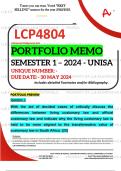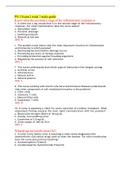Tutors you can trust. Voted “BEST
SELLING” memos for the year 2022/2023.
LCP4804
Advanced indigenous law
PORTFOLIO MEMO
SEMESTER 1 – 2024 - UNISA
UNIQUE NUMBER: -
DUE DATE: - 30 MAY 2024
Includes detailed Footnotes and/or Bibliography.
PORTFOLIO PREVIEW
Question 1.
With the aid of decided cases of critically discuss the
differences between living customary law and official
customary law and indicate why the living customary law is
held to be more aligned to the transformative value of
customary law in South Africa. [25]
Disclaimer
Extreme care has been used by our Tutors to draft this document, however the contents are provided “as is” without any representations
or warranties, express or implied. This document is to be used for comparison, research and reference purposes ONLY. No part of this
document may be reproduced, resold or transmitted in any form or by any means without prior written permission from the Author. –
LLB EXAMPACKS & TUTORIALS.
PAST PAPERS & MEMOS, ASSIGNMENT MEMOS, NOTES, SUMMARIES & TUITIONS.
Cell: 062 810 8624 Email: llbexampacks@gmail.com
Fax: 086 096 5452 www.llbexampacksandtutorials.co.za
, Question 1
With the aid of decided cases of critically discuss the differences between living
customary law and official customary law and indicate why the living customary
law is held to be more aligned to the transformative value of customary law in South
Africa. [25]
Official Customary Law
In general, the official customary law reflects state interests and is part of state law. The
official version of customary law is found in statutes, law reports, the South African Law
Reform Commission reports, text books, university lectures and other public documents.
According to Ndima, the official version of customary law depends on alien values for
validity. Mogoro J, in Du Plessis v De Klerk1, points out that customary law "has
lamentably been marginalised and allowed to degenerate into a vitrified set of norms
alienated from its roots in the community". Costa puts it thus:Customary law as it stands
is corrupted, inauthentic and lacking authority. It is a foreign imposition, a stranger in
Africa.2
In Fosi v Road Accident Fund,3 the court put it as follows:
Indigenous African customary law has occupied an unfortunate position in the legal
history of our country. The fact is that it was hardly recognized by the law-makers and
was accordingly scarcely applied in the South African courts. It enjoyed the status of being
known that it existed and its continued existence was merely tolerated as a necessary
evil.
In Sigcau v Sigcau,4 the Appellate Division held that the individual person was the owner
of the royal family home and not merely the controller of the property. Ndima 5 puts it thus:
MEMO CONTINUES ON THE NEXT PAGE……⬇️⬇️⬇️
1Van Niekerk 2001 CILSA 480.
2 Costa 1998 SAJHR 525, 534.
3 Fosi v Road Accident Fund 2008 3 SA 560 (CPD) 567.
4 Sigcau v Sigcau 1944 AD 67 79.
5 Ndima 2007 Speculum Juris 83-84.






